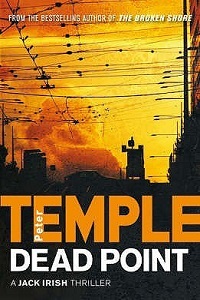
Title: Dead Point
Author: Peter Temple
Pages: 275
Published Date: 2000
Publisher: Text Publishing
Series Details: 3rd book in the Jack Irish series
Publisher's Synopsis
Jack Irish - lawyer, gambler and people-finder - is hunting down the villains who hijacked the winnings from his latest betting coup when he is hired by a mystery client to find missing barman Robbie Colburne. But Robbie turns up dead of a drug overdose. The case should be closed, but the dashing young barman was far from what he seemed, and the client wants to know more.
As Jack explores the young man's past, he finds himself drawn int oa deadly network of power, politics and money. In this world, nothing can be taken at face value and everyone is expendable - including Jack.
A taut and gripping thriller set in a sharply-drawn world of pubs, racetracks and dangerous people, Dead Point is Peter Temple at his finest.
My Review
The 3rd book in Peter Temple's Jack Irish series finds the suburban solicitor / gambler / cabinet-maker / people finder in the early stages of a bit of a crisis. Apart from still trying to get over the fact that his beloved footy team, the Fitzroy Lions have been taken over by Brisbane, now it looks as though his sideline interest with racehorse betting plunges is in danger. With these distractions in mind, it's a wonder that he is able to also focus on his concentration on his real job.
Speaking of his real job, he was supposed to be tracking down a missing barman named Robbie Colburne for his occasional employer Cyril Wootten but he hasn't really been able to keep his mind on the job long enough to make any progress. By the time he decides he'd better make a move, Colburne has turned up in his own car and in his own garage, dead of a drug overdose. The police are prepared to call it an accidental death, Irish is not nearly satisfied with that, preferring to look into the death a little more closely.
When he does, he gets to meet the real client, the man who wanted Colburne found in the first place. It turns out that the client is a judge, Justice Colin Loder and it seems that Colburne has taken something belonging to the judge. It wasn't Colburne that Loder wanted but what Colburne had taken. It's at this point that Irish feels that his gut instincts may just have been correct and is encouraged to increase his efforts.
The problem is, Irish has no idea just what it is that Colburne was involved in, or with whom. But thanks to the questions he asks and the people he asks them to, he is about to find out in no uncertain terms that they're not happy with the attention.
Followers of the series to this point will be fully aware of the nice, settled routine of Jack Irish, in fact, it's his hobbies and pastimes that give him his added appeal. But there's a chilling air of change in the wind and it could blow ill for everyone.
He is a man who runs a very relaxed practice, filling in his down time with the thrill of setting up big betting plunges with Harry Strang and then relaxing in Charlie Taub's cabinet-making workshop. Well, it seems that Jack is entering a rather unsettled period of his life with all of his trusted emotional outlets in danger of coming to an end. Firstly, Harry Strang is talking of retirement, then the acerbic old cabinet-maker, Charlie Taub is off to Western Australia to attend a wedding and Irish is petrified that Charlie may decide he likes the west enough to want to stay. To top things off, Meakers Coffee Shop, his reliable source of top quality coffee has changed owners and the coffee is now undrinkable. Transition has hit Jack Irish and he's afraid to think what else could be coming just around the corner.
There are two storylines running in parallel throughout the course of the book. The main storyline involving the investigation into the death of Robbie Colburne and the possible ramifications it has is paced by a more personal investigation. Twice now, people carrying Jack's betting team's winnings have been bashed and robbed. Retribution has to be swift and brutal. Tracking the quarry punctuates the entire story, breaking in whenever the main storyline needs a bit of a breather.
I found that you really need to be on your toes while reading this book with a large array of characters who are introduced, questioned and then dismissed in quick succession. Some of them will be significant, others won't, but it pays to remember them all and this was easier said than done. There are a lot of tenuous connections and many opportunities for losing the thread of the story, particularly when, at the start of a new chapter Jack is about to interview a new character without any explanation of how they fit into the story. Although this is worked in later on, it is still rather unsettling.
Dead Point unfolds at a conservative pace with Irish fitting his investigation around his personal life. He may chase up a few leads and then slip over to his betting syndicate task before heading to the cabinet-making workshop for a spot of quiet reflection. In short, this is a predominately character driven story that revolves around the further development of Jack Irish and his Fitzroy cronies, all of who are wonderfully portrayed too.
Dead Point earned Peter Temple his 3rd Ned Kelly Award for best Australian Crime Novel for 2001 and it is a novel of terrific depth and sincerity told from the troubled perspective of Jack Irish. The Jack Irish books are all very enjoyable crime novels that take you into the working-class suburbs of Melbourne filled with anguish, danger and some very ordinary coffee.


